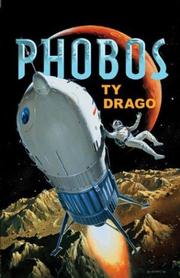 |

Phobos
by Ty Drago
(Tor, $25.95, 431pages, hardcover; November 2003.)
Review by Stuart Jaffe
Before I dive into this one, I thought I'd just save you  the
trouble of reading the whole review. Go buy this book. It's a great
read, a lot of fun, and worth the hardcover price. the
trouble of reading the whole review. Go buy this book. It's a great
read, a lot of fun, and worth the hardcover price.
Need more convincing? OK, then go ahead and read the review.
First off, the lowdown: Something is killing people at a research station
on Phobos, Mars's smallest moon. A military team is sent in, but several
key members fall victim to the Phobos Beast. Enter Lieutenant Mike Brogue
-- the only native Martian to become a commissioned officer for the
Terran Peacekeepers. Brogue's investigation will unravel a complex plot
that involves deception, murder, and attempted genocide -- all this
and he has to deal with bigotry, too! Will Brogue crack the case before
he becomes the Phobos Beast's next entrée?
That's the gist of this exciting book. Need more? OK, fine. Here's
why this is such a great story.
It works.
That's not an easy statement to make about most books these days (perhaps
that was true in those days as well, but I'm only privy to these
ones). When it comes to science fiction/mystery stories, it's near impossible.
Asimov managed to write some entertaining SF/mysteries, but they suffered
from the same flaws as many Asimov novels. Now, I loved reading Asimov
when I did, but the man had his shortcomings, and they are all too prevalent
in The Caves of Steel and his other mysteries. The flaw I refer
to is superficiality. These novels have great sf ideas and a decent
mystery, but they never rise beyond the basics of those genres. They
never delve deeply into the characters.
David Brin's Kiln People also proved to be entertaining and
thought-provoking; however, as far as mysteries go, this detective story
fell apart in the end with a cliché villain. There are other
examples as well, but you get the idea. The problem is this: the conventions
of these two genres, science fiction and mystery, tend to be opposed
to each other.
For example, in science fiction, we generally look down upon clumps
of exposition or obvious exposition placed into a conversation. ("As
you already know, Bob, the Xoran initiative changed the way we think
about wormholes. But let me explain it to you anyway...") In mysteries,
this technique (most notably obvious in the numerous Q & A sessions
a detective encounters) can comprise a bulk of the story. It's expected,
accepted, and crucial. Melding the two genres thus poses serious conflicts
that, if not resolved, ruin the experience for lovers of either genre.
Along comes Ty Drago. He makes it work. In fact, I suspect mystery
lovers would take to Phobos as much as science fiction fans.
Drago has managed to utilize the best of both genres and discard the
rest, while deftly manoeuvring through the problematic differences.
The mystery is compelling and its solution satisfying. The science is
integral to the story and integral to the mystery; this latter
point represents another failing in many sf mysteries. Also, the storytelling
actually matches all those catch-phrases you expect to see on mystery
thrillers ("pulse-pounding", "rollercoaster ride", "thrilling and suspenseful",
"edge of your seat" ...) -- only this time, for once, the book delivers.
That's not to say that Drago's book is flawless. The opening is exciting
but then grinds down into too much character setup. While important,
this information could have been doled out in smaller bits. Also, in
an effort to be crystal-clear about the technologies the author has
fabricated, he sometimes over-explains things. We readers can infer
quite a bit, if given the chance.
Still, when this book gets cooking (and that happens the second Brogue
lands on Phobos), it never lets up. I found myself, literally, staying
up late just to read a little bit further.
But wait! There's more! Drago also creates a fantastic main character
-- Mike Brogue. The personal dilemmas this man endures, both physical
and emotional, drive him to extreme lengths yet ground him into believable
actions. In other words, the guy is a fully drawn, fully realized character.
What's more, unlike many detectives before him, you can credit that
he's got the brains and the gut instinct for the job. Even as events
become more and more muddled, you believe that soon Brogue will shine
a light on it all, as he does.
The supporting characters are all well conceived, too, and Brogue's
sidekick, Sergeant "Stone" Choi, makes the perfect Watson to Brogue's
Sherlock Holmes.
Most importantly, when you finish reading Phobos, you'll want
to read another Mike Brogue mystery. This could (if Drago and Tor wish
to do it) be the beginning of a successful, long-running sf mystery
series.
If it sounds like I'm over-praising this novel, well, tough. I found
myself continually being impressed with the story. Don't get the wrong
idea, though. This is not ground-breaking material. This is not China
Miéville or William Gibson. It's just solid writing. If anything,
Ty Drago has produced a classic Golden Age science fiction tale that
gave me the thrill I once got when discovering Heinlein and Asimov.
This is the kind of book that will attract new readers to the genre
and should garner many awards. I highly recommend it.

|
 |



